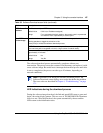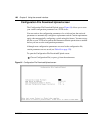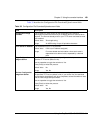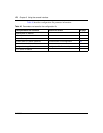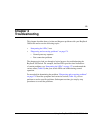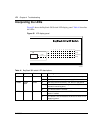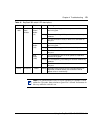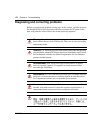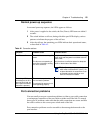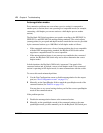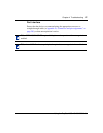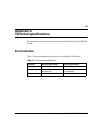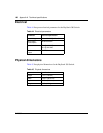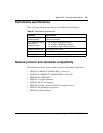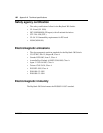
Chapter 4 Troubleshooting 175
Using the BayStack 380 10/100/1000 Switch
Normal power-up sequence
In a normal power-up sequence, the LEDs appear as follows:
1 After power is applied to the switch, the Pwr (Power) LED turns on within 5
seconds.
2 The switch initiates a self-test, during which the port LEDs display various
patterns to indicate the progress of the self-test.
3 After the self-test, the remaining port LEDs indicate their operational status,
as described in Table 42.
Port connection problems
You can usually trace port connection problems to either a poor cable connection
or an improper connection of the port cables at either end of the link. To remedy
these types of problems, make sure that the cable connections are secure and that
the cables connect to the correct ports at both ends of the link.
Port connection problems are also traceable to the autonegotiation mode or the
port interface.
Table 42 Corrective actions
Symptom Probable cause Corrective action
All LEDs are off. The switch is not receiving AC
power.
Verify that the AC power cord is fastened securely
at both ends and that power is available at the AC
power outlet.
The fans are not operating or
the airflow is blocked, causing
the unit to overheat.
Verify that there is sufficient space for adequate
airflow on both sides of the switch.
Note:
Operating temperature for the
switch must not exceed 40°C (104°F). Do
not place the switch in areas where it can
be exposed to direct sunlight or near
warm air exhausts or heaters.
The Activity LED for a
connected port is off or
does not blink (and you
have reason to believe
that traffic is present).
The switch is experiencing a
port connection problem.
See “Port connection problems” next.
The switch’s link partner is not
autonegotiating properly.



